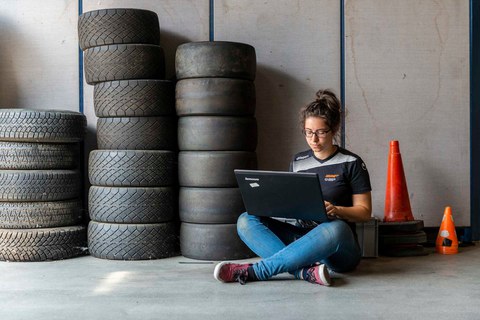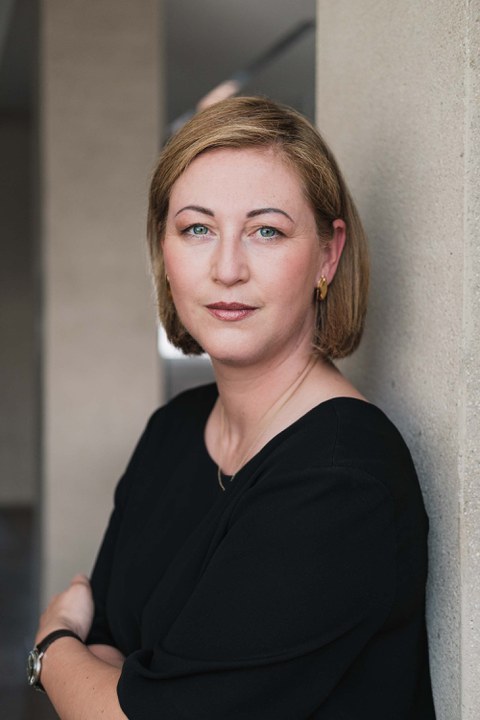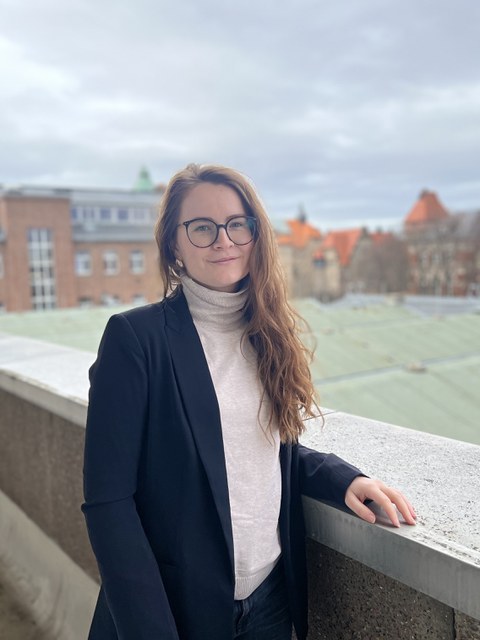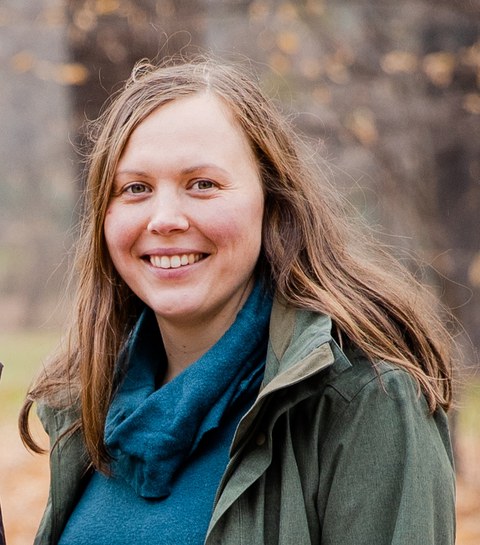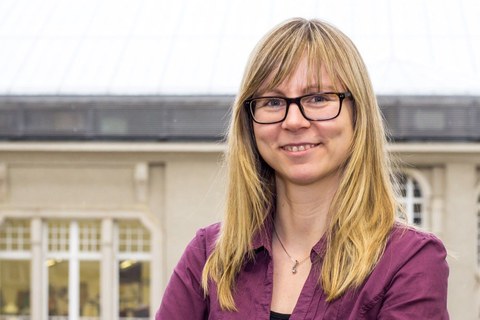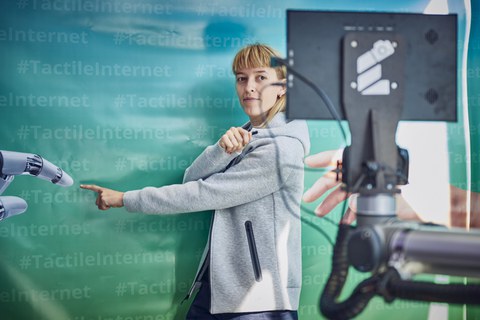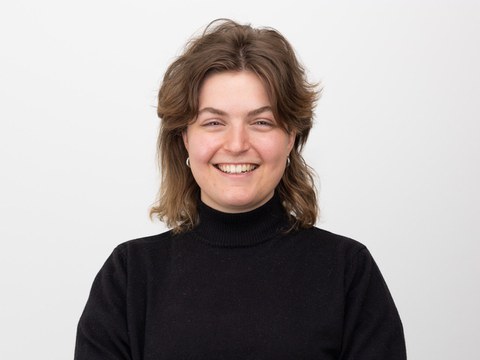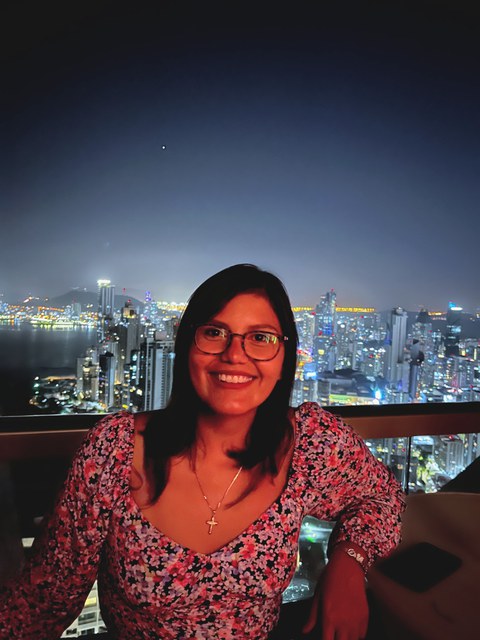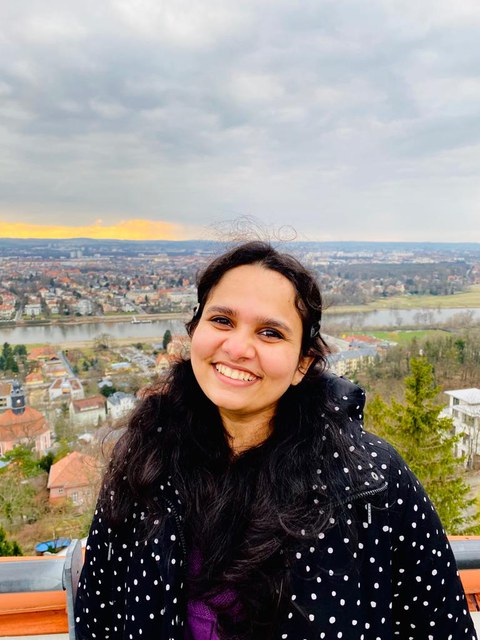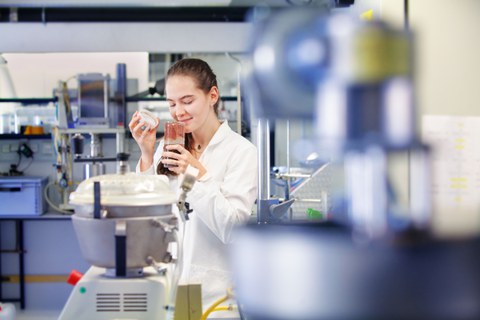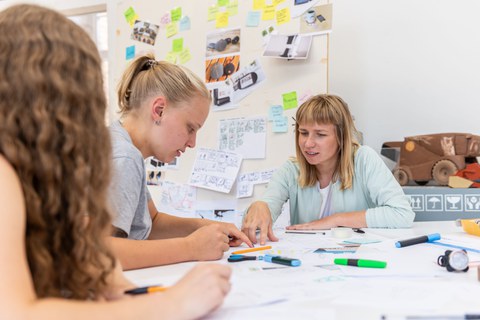ING-Portraits
Die Entscheidung für ein Studium ist eine wichtige Weichenstellung für die eigene Zukunft. Besonders in den MINT-Fächern sind Frauen häufig noch immer unterrepräsentiert. Ziel der TUD ist es deswegen, junge Frauen über ihre Studienmöglichkeiten zu informieren und sie zur Aufnahme eines technischen oder naturwissenschaftlichen Studiums an der TUD zu motivieren. Dabei ist die Sichtbarmachung weiblicher Vorbilder und die Vermittlung von Informationen über zukünftige Studieninhalte sowie von Praxiserfahrungen und Kenntnissen über mögliche Anwendungsgebiete der MINT-Fächer im „echten Leben“ ein wichtiger Baustein. Auf dieser Seite wollen wir Ihnen in Form kurzer Portraits interessante MINT-Frauen vorstellen.
Können Sie uns etwas über Ihren akademischen Hintergrund und Ihre Forschungsarbeit in den Ingenieurwissenschaften erzählen?
Ich habe meine größte Leidenschaft – desining – studiert und mich immer besonders für Design an den Schnittstellen zu Technik und Gesellschaft interessiert. Ich forsche und lehre an der Schnittstelle von Design, Innovation und gesellschaftlicher Transformation. Mein Fokus liegt auf ko-kreativen, systemischen und gestaltungsorientierten Innovationsprozessen – oft in enger Zusammenarbeit mit Ingenieur:innen, Architekt:innen, Stadtgestalter:innen, Landschaftsarchitekt:innen sowie zivilgesellschaftlichen Akteur:innen. Der Mensch steht dabei immer im Mittelpunkt meines Handelns. Ich bin keine Ingenieurin im klassischen Sinne – meine Perspektive ist gestaltungs- und transformationswissenschaftlich geprägt. Nach Stationen in der Automobilindustrie und der Internationalen Zusammenarbeit, habe ich den Schritt zurück in Akademia gewagt, um hier die Öffnung hinzu inter- und transdisziplinärer zusammenarbeit einzubringen und zu erforschen. Durch zahlreiche inter- und transdisziplinäre Projekte mit Ingenieur:innen, Architekt:innen und Akteur:innen aus Verwaltung und Gesellschaft bringe ich jedoch Erfahrung darin mit, wie sich technologische, soziale und kulturelle Perspektiven auf Wandel produktiv zusammenführen lassen. Gerade die dialogische Öffnung solcher Systeme ist mir ein zentrales Anliegen, die bedeutet, den akademischen Elfenbeinturm zu verlassen und neue Akteur:innen einzubeziehen.
Welchen Forschungsschwerpunkt haben Sie?
Ich forsche zu Innovationsprozessen, die nicht nur technische, sondern auch soziale, kulturelle und ökologische Dimensionen adressieren. Im Zentrum steht die Frage, wie wir durch gestaltungsorientierte Methoden – insbesondere durch Design und Co-Kreation – gesellschaftliche Transformationen systemisch unterstützen können. Mein Ansatz ist inter- und transdisziplinär und verortet sich zwischen Designforschung, Innovationsmanagement, Nachhaltigkeitswissenschaften und Transformationsforschung. Besonders interessiert mich:
- Partizipative Innovation – wie Stakeholder und Bürger:innen als Mitgestaltende eingebunden werden können
- Systemisches Design – zur Neugestaltung komplexer Zusammenhänge in Verwaltung, Stadtentwicklung und Wirtschaft
- Design als Leadership- und Governanceinstrument – vor allem in öffentlichen Institutionen und sozialräumlichen Kontexten
Ich verstehe Innovation dabei nicht als linearen Fortschritt, sondern als verantwortungsvolle Gestaltung möglicher Zukünfte – besonders dort, wo soziale Gerechtigkeit, planetare Grenzen und kollektives Lernen ineinandergreifen.
Welche Projekte oder Forschungsarbeiten haben Sie in letzter Zeit durchgeführt?
Vor meiner Zeit an der TUD habe ich in einem Bundesministerium ein Innovationslabvor zur digitalen Verwaltungsmodernisierung mit Fokus auf Wirkung, Beteiligung und lernende Institutionen gestaltet, zuvor in der Automobilindustrie die digitale Transformation erforscht und bearbeitet. Im Rahmen der Vertretungsprofessur am Lehrstuhl für Technisches Design habe ich überwiegend neue Team-Strukturen für die Zusammenarbeit eingeführt, neuen Kooperationen für den Lehrstuhl angestoßen und Lehrveranstaltungen gegeben. Nun blicke ich mit großer Neugier und Vorfreude auf die Internationale interdisziplinäre Herbstschule, die ich gemeinsam mit Prof. Nora Huxmann und Prof. Robert Knippschild das zweite Mal in Hoyerswerda, Lausitz am Ende des Sommersemesters durchführen werde – dank der großzügigen FOSTER Förderung ist es uns möglich, hier innerhalb einer Woche interdisziplinäre Projekte zur Freiraumgestaltung für Bewohnende in Hoyerswerda zu entwickeln und mit einer Ausstellung vor Ort der Gesellschaft zu präsentieren. Hier steht die Verknüpfung von Raumplanung, sozialer Innovation und Designforschung in strukturschwachen Regionen im Mittelpunkt.
Welche beruflichen Ziele haben Sie als Professorin?
Fachlich-forschend möchte ich weiterhin an der Schnittstelle von Designforschung und Transformationsforschung gestalterisch denken und handeln – wo ich dies tun darf, ist allerdings noch offen. Ich möchte Räume schaffen, in denen neue Denkweisen über Gestaltung, Technik und Gesellschaft entstehen – mit kritischer Offenheit, Mut zur Ungewissheit und einer klaren ethischen Haltung. Für die Schnittstellen zu den Ingenieurswissenschaften, würde ich mehr eine neue CForm der Öffnung und gegenseitige Neugier wünschen, Mensch & Technik enger zu verbinden. Die Technikdominanz macht es hier herausfordernd, Kollegen und Kolleginnen zu überzeugen, neue Pfade einzuschlagen – hier liegt jedoch für mich das Potenzial: im Betreten von neuen Inter- und transdisziplinären Pfaden. Langfristig wünsche ich mich, dass Design beyond methods verstanden wird – und uns allen hilft, besser, konstruktiver und weniger kompetitiv sondern disziplinübergreifend zu agieren
Was hat Sie dazu inspiriert, in diesem Bereich zu forschen und letztendlich eine Karriere als Ingenieurin und Professorin einzuschlagen?
Mich fasziniert, wie durch Gestaltung neue Zukünfte denkbar werden. Innovation bedeutet nicht primär technische, sondern gesellschaftliche Erneuerung. Diese Resonanzräume zu eröffnen, ist meine Motivation. Nach Stationen in der Automobilindustrie und im Bundesministerium für internationale Zusammenarbeit, war es mir wieder ein Anliegen, eigene Fragestellungen im Kontext der Designforschung zu bearbeiten, einen erweiterten Designbegriff zu lehren und die Perspektive und die Fragen jüngerer Generationen kennenzulernen. Ob meine weitere Station in der Forschung oder in der Praxis, oder an einer Schnittstelle stattfinden wird, wird die Zukunft zeigen.
Welche spezifischen Herausforderungen haben Sie auf Ihrem Weg zur Professorin in den Ingenieurwissenschaften gemeistert, insbesondere als Frau in einem oft männlich dominierten Bereich?
Als jemand, der nicht aus dem klassischen ingenieurwissenschaftlichen Kontext stammt, war es eine Herausforderung, zwischen Disziplinen und Denkschulen zu vermitteln und diese zu verstehen. Diese „Grenzgängerinnenschaft“ hat mir ermöglicht, neue Denk- und Handlungsräume zu erschließen – gerade in Kooperation mit Architekt:innen, Stadtplaner:innen und Gestalter:innen. Tatsächlich habe ich hier in der Ingenieursforschung ein sehr männlich geprägtes Umfeld kennengelernt, sowohl in der direkten Zahl der Frauen, die sich im Bereich der Ingenieurswissenschaften sichtbar sind, als auch in der männlich-dominierten Arbeitskultur, die besonders im Bereich der Kommunikation oft große Unterschiede und Herangehensweisen zeigen – deutlicher als in der Praxis, aus der ich kam. Ein Entwicklungsfeld! Da ist noch viel zu tun, umso wichtiger, die wenigen Vertreterinnen nicht zu vergraulen, sondern sie als positiven Beitrag zu Diversität und Inklusion zu sehen, um auch Forschungsergebnisse besser zu machen.
Wie sehen Sie die Zukunft der Ingenieurwissenschaften in Bezug auf Innovation und gesellschaftlichen Fortschritt, insbesondere im Hinblick auf die Herausforderungen des Klimawandels und der nachhaltigen Entwicklung?
Die Herausforderungen unserer Zeit verlangen einen Perspektivwechsel. Ich wünsche mir eine stärkere Öffnung der Ingenieurwissenschaften für gesellschaftliche, gestalterische und kulturelle Dimensionen von Innovation. So herausfordernd interdisziplinäre Zusammenarbeit auch ist – sie ist notwendig, um echte Transformation zu gestalten, daran glaube ich fest.
Können Sie uns etwas über Ihren akademischen Hintergrund und Ihre Forschungsarbeit in den Ingenieurwissenschaften erzählen?
Ich habe Wirtschaftsingenieurwesen an der TU Dresden studiert. Die Kombination von technologischer Vielfalt und ökonomischen sowie sozial-ökologischen Aspekten hat mich schon immer fasziniert. Durch meine Diplomarbeit habe ich auch die Freude am wissenschaftlichen Arbeiten gefunden. An der Professur für Betriebswirtschaftslehre insb. Organisation habe ich begonnen, zur Wissensintegration in heterogenen Gruppen zu forschen. Besonders Spaß machen mir die qualitative Forschung und das tiefe Eintauchen in Wirkzusammenhänge und soziale Gefüge. Heute arbeite ich am CIMTT Zentrum für Produktionstechnik und Organisation – das Kompetenzzentrum für Wissens- und Technologietransfer der Fakultät Maschinenwesen. Die Kooperation mit unterschiedlichen Forschungsgruppen und Praxispartnern ist immer wieder lehrreich und spannend.
Welchen Forschungsschwerpunkt haben Sie?
Meine Begeisterung für sozialwissenschaftliche Forschung ist wahrscheinlich eine Besonderheit in den Ingenieurwissenschaften, gleichzeitig steckt darin aber auch viel Potential. Ich forsche zur transdisziplinären Zusammenarbeit in den Ingenieurwissenschaften, insbesondere zur Wissensintegration zwischen wissenschaftlichen und nicht-wissenschaftlichen Akteuren im Rahmen von Transformationsprozessen. Ich untersuche die Rolle von Ingenieuren in der Transformation und die wissenschaftliche Wirkung von transdisziplinärer Forschung. Mein Ziel ist es, Technikentwicklung partizipativer, menschgerechter und anwendungsorientierter zu gestalten.
Welche Projekte oder Forschungsarbeiten haben Sie in letzter Zeit durchgeführt?
Ich bearbeite aktuell das Projekt „Zukunftswerkstatt Lausitz 2050 – Energie im Fokus“. Gemeinsam mit Forschenden der Professur für Energieverfahrenstechnik habe ich einen Diskussions- und Beteiligungsraum geschaffen, in dem sich Akteure aus Zivilgesellschaft, Wirtschaft und Wissenschaft austauschen können. Die Teilnehmenden diskutieren, wie eine nachhaltige Energielandschaft der Zukunft in der Strukturwandelregion Lausitz aussehen kann und entwerfen gemeinsam Zukunftsvisionen. Die Workshops führen wir zu je zwei Terminen in Dresden und Spremberg durch. Ziel ist es, wissenschaftliches Wissen verständlich zu vermitteln und gemeinsam konkrete Lösungsansätze zu entwickeln. Im Rahmen meiner Promotion begleite ich das Projekt mit Interviews, Beobachtungen und Befragungen, um das Konzept und die wissenschaftliche Wirkung zu evaluieren. Das Projekt findet im Rahmen des Hochschulwettbewerbs im Wissenschaftsjahr 2025 zum Thema Zukunftsenergie statt und wird vom BMFTR und Wissenschaft im Dialog gefördert.
Welche beruflichen Ziele haben Sie als Wissenschaftlerin?
Ich möchte etwas bewegen, in der Forschung, aber auch in der Praxis. Ich möchte Menschen zusammenbringen und ihnen helfen, produktiver, offener und reflektionsbereiter miteinander zu arbeiten. Mit meinem Wissen, dass ich mir aktuell im Rahmen meiner Promotion aneigne, möchte ich später mal Unternehmen in Transformationsprozessen begleiten oder transdisziplinäre Forschungsprojekte entwickeln. Dazu gehört auch, dass ich gern andere Menschen für meine Forschung begeistern und sie z.B. in der Lehre, in studentischen Arbeiten oder Projekten weiterbilden möchte.
Was hat Sie dazu inspiriert, in diesem Bereich zu forschen?
Die gelebte Forschungs- und Anwendungspraxis, viele Gespräche mit Menschen in meinem Forschungsumfeld und wachsenden Netzwerk, aber auch Konferenzen zur partizipativen und transdisziplinären Forschung, die mir gezeigt haben, dass es Menschen gibt, die ähnlich denken und sich ähnliche Fragen stellen wie ich.
Welche spezifischen Herausforderungen haben Sie auf Ihrem Weg zur Wissenschaftlerin in den Ingenieurwissenschaften gemeistert, insbesondere als Frau in einem oft männlich dominierten Bereich?
Am Anfang hatte ich keine Ahnung, was mich als Frau in den Ingenieurwissenschaften erwarten wird. Ich habe gar nicht in Frage gestellt, dass ich einen Platz am Tisch haben kann. Im Laufe der Monate habe ich immer wieder Situationen erlebt, in denen ich leiser wurde, in denen meine Themen als nicht wichtig, nicht technisch genug abgewertet wurden. Zunehmend wächst aber mein vertrauensvolles Umfeld und ich habe Mentorinnen, die mich auf meinem Weg unterstützen. Ich weiß mittlerweile, an welchen Stellen ich laut sein kann, meine Meinung, Erkenntnisse und Fragen teilen kann. Ich nutze diese Wege und spare meine Energie für die wichtigen Herausforderungen.
Wie sehen Sie die Zukunft der Ingenieurwissenschaften in Bezug auf Innovation und gesellschaftlichen Fortschritt, insbesondere im Hinblick auf die Herausforderungen des Klimawandels und der nachhaltigen Entwicklung?
In den klugen Köpfen der Ingenieurwissenschaften steckt unglaublich viel Potential für Innovation und gesellschaftlichen Fortschritt. Ich zweifele nur daran, dass wir mit einem ‚Immer weiter so‘ die drängenden gesellschaftlichen Herausforderungen lösen können. Ich stelle mir, auch im Rahmen meiner Forschung, oft die Frage, ob Effizienzsteigerung weiterhin das zentrale Paradigma der Technikentwicklung bleiben kann oder ob auch andere Aspekte sinnvoll und wünschenswert sind. Es gibt viele Formate für Kollaboration, Beteiligung und Austausch und ich wünsche mir für die Ingenieurwissenschaften mehr Perspektivoffenheit und Reflektionsbereitschaft, um auch kritische Stimmen zuzulassen. Ziel sollte es sein, die gesellschaftlichen Herausforderungen gemeinsam zu bewältigen und nicht der Gesellschaft, die wissenschaftlichen Innovationen einfach überzustülpen.
Welche Möglichkeiten sehen Sie, junge Mädchen und Frauen für die Ingenieurwissenschaften zu begeistern und sie zu ermutigen, sich in diesem Bereich zu engagieren?
Meine Begeisterung entstand durch meinen Vater, der Handwerker ist und mir alles zeigte, was seine Arbeit ausmacht. Ich entwickelte eine Faszination für unterschiedliche Materialien, wollte verstehen, wie Maschinen funktionieren und wie ich kleine technische Probleme selbst lösen kann. Ich sehe die Möglichkeit zur Begeisterung von jungen Mädchen und Frauen schon in der Kindheit und Jugend, durch Projekttage im Kindergarten, durch die Kinderuni in der Grundschule oder häufigere Praktika in der erweiterten Schule. Ganz zentral sehe ich eine Veränderungsmöglichkeit im Verständnis unserer Gesellschaft. Es sollte keine Jungs- oder Mädchen-Berufe mehr geben, keinen Bagger-Jungs und Barbie-Mädchen. Alle sollten alles ausprobieren dürfen, ohne Vorurteile, Hemmnisse und Verurteilung, sondern mit Mut und Unterstützung.
Was möchten Sie jungen Mädchen mit auf den Weg geben, die eine Karriere in den Ingenieurwissenschaften anstreben?
Immer neugierig bleiben und sich von nichts und niemandem vom eigenen Weg abbringen lassen, aber auch Support und Mentoring annehmen, von Menschen, die schon einmal in ähnlichen Situationen waren. Es bringt nichts mit dem Kopf immer wieder gegen die Wand zu laufen. Wichtiger ist es, den eigenen Weg zu finden.
Welche Rolle sehen Sie für Frauen in den Ingenieurwissenschaften?
Keine andere als für Männer in den Ingenieurwissenschaft.
Wie gehen Sie mit der Vereinbarkeit von Familie und Karriere um?
Das ist ein schwieriges Thema, denn ich hätte gern beides und weiß, dass das ein Kraftakt wird. Das Bewusstsein darüber, wie schwer das insbesondere in der Wissenschaft ist, stellte sich bei mir erst nach und nach ein. Noch habe ich keine familiären Verpflichtungen, aber die befristeten Verträge, die ungewissen Projektanträge und den Druck, im Rahmen von Publikationen und Konferenzteilnahmen immer präsent sein zu müssen, nehme ich als große Anstrengung wahr.
Welche Rolle spielen Ihrer Meinung nach Diversität und Inklusion in den Ingenieurwissenschaften und wie können wir sicherstellen, dass verschiedene Perspektiven gehört werden?
Gelebte Diversität und Inklusion sind unglaublich wichtig, vor allem von den Menschen, die nicht darauf angewiesen sind. Es braucht immer wieder Menschen, die Frauen an den Tisch einladen. Genauso braucht es Menschen, die Personen aus marginalisierten Gruppen, Beachtung schenken und ihre Perspektive wirklich hören wollen. Offenheit, Reflektionsbereitschaft und Kritikfähigkeit sind nicht nur in der transdisziplinären Zusammenarbeit zentrale Faktoren, sondern auch in der inklusiven Zusammenarbeit auf Teamebene. Auch ich merke manchmal, dass ich vielleicht noch nicht jede Person mitdenke, nicht gut zuhöre und auch mal ausschließende Gedanken habe. Das Wichtigste ist, dass wir uns immer weiterentwickeln wollen, kritische Hinweise annehmen können und es beim nächsten Mal besser machen.
Können Sie uns von einem besonders inspirierenden Moment in Ihrer Karriere als Ingenieurin und Wissenschaftlerin berichten?
Die Summer School „Soziale Innovationen in MINT“ im letzten Jahr, die ich mit Hilfe von Gleichstellungsmitteln für Studierende an der TU Dresden organisieren durfte. Einerseits war es großartig, wie mich Menschen aus meinem Netzwerk bei der inhaltlichen Durchführung unterstützt haben. Andererseits war die Rückmeldung von den Teilnehmenden sehr positiv. Die überwiegend weiblichen Studierenden haben mir zurückgemeldet, dass die Lösungen gesellschaftlicher Herausforderung für sie relevant ist und dass wir als Frauen gemeinsam etwas bewirken können. Das hat mich angespornt, weiterzumachen und weitere Projekte anzustoßen.
Schon wenn ich als Kind mit meinen Eltern im Garten war, habe ich immer die Bäume, Häuser und Steine angeschaut und mich gefragt, woraus die Dinge wohl bestehen. Ich hatte mir vorgestellt, es gibt ein Element Holz, ein Element Stein, ein Element Gras ... und mir überlegt, was diese Elemente wohl ausmacht und was sie unterscheidet, warum manche Dinge hart und manche Dinge weich sind, manche dunkel und manche hell. Welche Antworten ich für mich selbst auf diese Fragen gefunden hatte, weiß ich heute nicht mehr.
Als in der Schule das Periodensystem behandelt wurde, war ich völlig fasziniert davon, dass die gesamte mich umgebende Vielfalt an Dingen aus einer überschaubaren Menge verschiedener Elemente besteht, die sich eigentlich nur in ihrer Anzahl an Elektronen, Neutronen und Protonen unterscheiden. Mit der jugendlichen Motivation, Kernenergie sicher und damit die Welt zu einem besseren Ort zu machen, bin ich nach der Schule direkt in ein Physikstudium gestartet. Es hat leider nicht lange gedauert, bis mich die Realität eingeholt hat und mir zeigte, dass theoretische Elektrodynamik und andere Fächer irgendwie sehr weit weg sind von dem, was ich eigentlich machen wollte. Zum Glück hatte ich schon nebenbei bei Fraunhofer als wissenschaftliche Hilfskraft gejobbt. Im Vergleich zu den meisten Inhalten aus meinen Vorlesungen fand ich es superspannend, womit die Wissenschaftler:innen sich dort den ganzen Tag beschäftigen. Es ging um reale, alltägliche Probleme und deren technische Lösungen. Ich habe dann so nebenbei rumgefragt, was meine Kolleg:innen alle so studiert haben: Neben Chemie und Physik kamen viele dort aus der Werkstoffwissenschaft. Ich bin sicher nicht die Einzige, die bis Anfang zwanzig noch nie was von "Werkstoffwissenschaft" gehört hat, also fing ich an, mich darüber zu informieren. Aha, also quasi wie Maschinenbau, aber mit dem Fokus auf den verwendeten Materialien und Werkstoffen, klingt doch eigentlich spannend. Es hat noch etwas gedauert, bis ich mir eingestehen konnte, bei der Studienwahl wirklich einen Fehler gemacht zu haben. Nach vier Semestern Physik habe ich dann im Werkstoffwissenschaftsstudium an der TU Dresden noch einmal ganz von vorn angefangen. Nach dem eher allgemein gehaltenen Grundstudium fingen im Hauptstudium die wirklich spannenden Spezialvorlesungen an. Ich habe wahnsinnig nette Kommilitonen kennengelernt, mich auf Funktionswerkstoffe spezialisiert und es bis heute keinen einzigen Tag bereut.
Was wir im Studium gelernt haben, ging weit über das Schulwissen hinaus: Was Metalle, Keramiken und Polymere eigentlich ausmacht und wie sie im Inneren aufgebaut sind, um genau die Eigenschaften zu besitzen, weswegen wir sie gezielt in allen möglichen Anwendungen einsetzen. Heute bin ich wissenschaftliche Mitarbeiterin am Institut für Werkstoffwissenschaft und beschäftige mich mit der Wechselwirkung von Werkstoffoberflächen mit ihrer Umgebung. Auch wenn ich mich jetzt schon so lange mit Werkstoffen beschäftige, haben sie nichts von ihrer Faszination verloren. Ganz im Gegenteil, ich habe eine noch größere Neugier auf all die Dinge, die ich noch nicht weiß, entwickelt.
Wie funktioniert ein Flugzeug, oder eine Dampfturbine? Welche Rolle spielen dabei Werkstoffe, die Konstruktion und die Herstellungsverfahren der Bauteile? Was steckt eigentlich dahinter, wenn ich im Auto oder im Zug von A nach B fahre oder mit dem Flugzeug fliege? All das sind Fragen, die ich mir immer wieder gestellt habe und die ich für mich selbst verstehen wollte. Hierfür bot sich zunächst ein Studium des Maschinenbaus an, wobei jede Menge Mathematik, Physik, Mechanik und Elektrotechnik die Basis für eine spätere Vertiefung legten. Die Studienrichtung Leichtbau hatte dann für mich die größte Vielfalt und auch die interessantesten Themen, die meinen Wissensdrang begegnen konnten. Kernthemen des Leichtbaus sind nicht nur leichte und feste Werkstoffe, sondern auch die Bestimmung und Berechnung ihrer Eigenschaften, die Konstruktion von Bauteilen und Systemen in Abhängigkeit ihrer äußeren Belastung sowie die Simulation als Mittels zur Auslegung von Bauteilen und der Vorhersage von kritischen Zuständen. Zusätzlich kommen weitere Themen, wie z.B. Elektromobilität oder „Künstliche Intelligenz“ mit hinzu, welche eine unendliche Vielfalt an Fragestellungen und Lösungsstrategien aufwerfen. Besonders die Mischung aus klassischen technischen Aufgaben kombiniert mit neuen Ansätzen, welche z.B. die Integration von Sensoren und Aktoren in kritische Bauteile zur Erfassung deren Zustandes sein können, ist für mich immer wieder interessant und motivierend.
Durch die Vielfalt der Themen, mit denen ich mich tagtäglich beschäftige, habe ich im beruflichen als auch im täglichen Leben viel gelernt und kann mir nun die Antworten auf meine alltäglichen Fragen auf Basis meines erworbenen Wissens herleiten.
Mit einem Faible für Mathe und Physik begann ich euphorisch ein Maschinenbaustudium in Berlin. Diese Wahl traf ich vor allem aufgrund der unzähligen Vertiefungsmöglichkeiten im Bereich Maschinenbau. Der Plan ging auf: Ein paar Semester später erfuhr ich vom Technischen Design an der TU Dresden, in welchem sich der konstruktive Entwicklungsprozess und das kreative Industriedesign treffen. Hier betrachten wir Bedürfnisse der Gesellschaft bis hin zum Nutzer, bevor es zum konkreten Produktkonzept kommt. In meiner Diplomarbeit habe ich zusammen mit geflüchteten Menschen in Dresden einfache Lösungen vor Ort entwickelt. Inzwischen arbeite und promoviere ich an der Professur für Technisches Design an der TU Dresden und erforsche wie Industriedesign helfen kann einen Dialog zwischen aktueller Wissenschaft und der Gesellschaft herzustellen. Konkret geht es dabei um das „Taktile Internet“, welches in Zukunft viele neuartige Anwendungen für Menschen ermöglicht. Diese Technologien verantwortungsvoll und im Austausch mit der Gesellschaft zu entwickeln, ist dabei im Exzellenzcluster CeTI (ceti.one) zentral.
Was hat Sie dazu bewegt, ein Studium in den Ingenieurwissenschaften aufzunehmen?
Nach der Schule habe ich ein freiwilliges wissenschaftliches Jahr in einem physikalischen Institut gemacht, weil ich das Fach superspannend fand. Bei einem Vortrag über einen Versuch auf der ISS, bei dem nach Jahren eine weitere Nachkommastelle der Erdanziehungskraft bestimmt werden konnte, dachte ich mir dann doch: Bisschen viel Aufwand – das ist es wohl doch nicht – ich brauche etwas Angewandteres. Weil mir dann die Arbeit in der Werkstatt Spaß gemacht hat, bin ich bei Maschinenbau gelandet.
Was fasziniert Sie besonders an Ihrem Studiengang bzw. Ihrem Fachgebiet?
Für mich ist es immer ein besonderes Gefühl, wenn nach viel Nachdenken und vielem Ausprobieren am Ende doch etwas entsteht, was real existiert und man in den Händen halten kann.
Gibt es bestimmte Themen oder Fachrichtungen innerhalb der Ingenieurwissenschaften, die Sie besonders interessieren?
Ich interessiere mich vor allem dafür, was für Auswirkungen Technik auf den Alltag von Personen hat und wie Technik auch außerhalb von traditionellen Räumen, wie beispielsweise der Industrie, partizipativ (weiter-)entwickelt werden kann. Beide Perspektiven fehlen häufig in der klassischen Ausbildung und ich erforsche aktuell, wie sie zu einer gerechten nachhaltigen Transformation zur Kreislaufwirtschaft beitragen können.
Haben Sie bereits konkrete berufliche Ziele oder Vorstellungen für Ihre Zukunft im Ingenieurwesen?
Ich würde gern weiter inter- und transdisziplinär forschend mit verschiedenen zivilgesellschaftlichen Akteur:innen zusammenarbeiten. Deshalb kann ich mir aktuell eine Promotion gut vorstellen.
Gab es besondere Herausforderungen auf Ihrem bisherigen Weg im Studium – insbesondere als Frau in einem häufig männlich dominierten Bereich?
Wenn ich erzähle, was ich studiere, werde ich meist zuerst gefragt: „Was für einen Frauenanteil habt ihr?” Das Thema ist häufig präsent und ich habe auch schon diskriminierende Situationen erlebt. Ich finde es schade, dass man lernen muss, damit umzugehen. Wenn man möchte, werden aber auch viele Möglichkeiten angeboten, sich mit anderen Personen über diese Erfahrungen auszutauschen, und man kann an spezifischen Förderprogrammen für FLINTA* im MINT-Bereich teilnehmen.
Wo sehen Sie die Rolle der Ingenieurwissenschaften bei aktuellen gesellschaftlichen Herausforderungen wie Klimawandel und Nachhaltigkeit?
Technische Entwicklungen können meiner Meinung nach nur ein Teil der Lösung für Herausforderungen wie Klimawandel und Nachhaltigkeit sein. Ich würde mir wünschen, dass Ingenieur:innen stärker hinterfragen, welche Auswirkungen ihre Produkte auf gesellschaftliche Verhaltensweisen haben – und ob sie wirklich zu einer nachhaltigeren Zukunft beitragen oder bestehende Probleme eher verschärfen.
Wie erleben Sie das Studium der Ingenieurwissenschaften in Bezug auf Diversität und Gleichstellung?
Aus meiner Perspektive gibt es viele positive Potenziale, wie zum Beispiel den hohen Anteil der internationalen Studierenden, die man mehr nutzen könnte, z.B. in dem durch die Organisation der Lehre mehr Gruppenarbeiten außerhalb der eigenen Freund:innen-Gruppe gefördert werden.
Was würden Sie jungen Mädchen oder Schülerinnen sagen, die überlegen, ein Fach in den Ingenieurwissenschaften zu studieren?
Ihr werdet viel Unterstützung erhalten, aber vielleicht auch unschöne Erfahrungen machen. Wenn ihr Interesse habt, lasst euch nicht vom Image abschrecken und macht es. Wir brauchen euch, um langfristig etwas zu ändern.
Welche Vorbilder oder inspirierenden Personen haben Sie auf Ihrem Weg besonders geprägt oder motiviert?
Meine Oma. Ganz anderes Fach, ganz andere Situation, aber sie hat trotz schwieriger Rahmenbedingungen, das studiert, worauf sie Lust hatte, und war dann sehr erfolgreich damit.
Wie erleben Sie den Austausch und die Unterstützung unter Kommilitoninnen und Kommilitonen?
Die ist super!
Was wünschen Sie sich von der Hochschule oder Gesellschaft, um Frauen im Ingenieurbereich noch besser zu fördern?
Mehr Querbezüge zu anderen Fächern herstellen und Nischen zeigen, um mit dem verstaubten Bild, dass Maschinenbauer:innen nur Autos konstruieren, aufzuräumen!
Können Sie uns von einem besonderen Erlebnis oder Erfolg in Ihrem Studium berichten, der Sie motiviert hat, weiterzumachen?
Es ist zwar kein Erlebnis aus meinem Studium, aber der Besuch einer Ausstellung zu Social Design war der Anstoß dafür, dass ich mich zum ersten Mal mit der Verbindung soziale Nachhaltigkeit und Technik auseinandergesetzt habe. Das hat mich damals sehr begeistert und in einer Weise denke ich auch jetzt in meiner Diplomarbeit immer noch darüber nach.
Schon seit meiner frühen Kindheit ist meine Begeisterung für den Weltraum entstanden. Alles begann, als ich in den USA in die Grundschule gegangen bin und damals mehrmals Ausflüge von der Schule in verschiedenen Museen über Astronomie und Raumfahrt gemacht hatte. Ich wohnte auch zum Teil in der Nähe von der NASA Langley Research Center in Virginia und fand damals schon die Idee einfach toll, wie man Menschen in den Weltall bringen kann und wie viele Sachen wir über unseres Universum noch nicht wissen und verstehen.
Ein paar Jahren später bin ich in meine Heimat, Panama, zurückgekehrt. Leider gibt es dort noch keine Raumfahrtbehörde, trotzdem war das kein Hindernis für mich. Irgendwann in der 11. Klasse habe ich angefangen mich darüber zu informieren, welche Studiengänge sich für mein Traum mit Astronauten zu arbeiten am besten eignen. Bei meiner Recherche bin ich auf das Studium Luft- und Raumfahrttechnik aufmerksam geworden und es hat mich angesprochen. Am Ende hat die Finanzierbarkeit und die Qualität eines Studiums in Deutschland dafür gesprochen, hier zu studieren.
Direkt nach meinem panamaischen Abitur bin ich nach Deutschland eingewandert, habe die Sprache ein halbes Jahr intensiv gelernt und ein Jahr lang ein Studienkolleg zur Anrechnung meines panamaischen Abiturs absolviert. Erst danach konnte ich mein Studium an der TU Dresden beginnen. Auf die TU Dresden bin ich gekommen, als ich nach den besten Universitäten in Deutschland für Luft- und Raumfahrttechnik recherchiert habe. Am Ende entschied ich mich dafür, weil kein Vorpraktikum zwingend notwendig war, um sich zu bewerben. Außerdem habe ich gehört, dass Diplomingenieure in Deutschland besonders gut angesehen werden.
Nun studiere ich ein Maschinenbau Diplom mit Vertiefungsrichtung in Luft- und Raumfahrttechnik. Im Grundstudium, also in den ersten 4 Semester, haben wir Maschinenbau als Grundlage. Ab dem 5. Semester beginnt man das Hauptstudium und dort habe ich die Vertiefungsrichtung Luft- und Raumfahrttechnik ausgewählt. Dadurch, dass das Studium aus Maschinenbau und Luft- und Raumfahrttechnik besteht, habe ich nach dem Studium eine große berufliche Auswahl. Ich bin mit meinem Abschluss nicht nur auf Luft- und Raumfahrttechnik beschränkt, sondern kann ich auch in vielen anderen ingenieurtechnischen Richtungen beruflich gehen.Ich empfehle das Studium, wenn ihr neugierig seid und Dinge gern verstehen möchtet. Ihr müsst aber euch auch bewusst sein, dass es nicht immer leicht und einfach sein wird. Aber mit der richtigen Motivation schafft ihr das! Ich freue mich auch, wenn immer mehr Frauen sich dieses Studium und ingenieurtechnische Berufen zutrauen.
Mein Ziel ist es eines Tages bei der ESA mit Astronauten zusammenzuarbeiten und ein Teil des Teams von Wissenschaftlern und Ingenieuren zu sein, die in das Vorantreiben von neuen und innovativen Technologien sowie die Weltraumerforschung mitwirken. Ich bin zuversichtlich, dass mein Studium an der TU Dresden den ersten Schritt zur Erfüllung dieses Ziels ist.
Eigentlich hatte ich nicht damit gerechnet, dass ich aus all den Stereotypen, die in meiner Gesellschaft existieren, herauskommen würde. Von einem Mädchen, das keine eigenen Entscheidungen treffen durfte, zu einer Person, die jetzt hier in Deutschland ist, fühlt es sich eher wie ein Traum an! Ich komme aus dem südlichen Teil Indiens. Mit meiner Liebe zur Mathematik und zum Problemlösen habe ich meinen Bachelor-Abschluss in Elektrotechnik und Elektronik in Indien gemacht und dann ein Jahr lang als Praktikantin bei der Indian Space Research Organization (ISRO) gearbeitet. Das war der Wendepunkt in meinem Leben, der mir den Weg nach Deutschland ebnete. Die häufigen Gespräche mit ISRO-Wissenschaftlern über die fortschreitende Miniaturisierung in der Mikroelektronikindustrie und das Wissen, das sie über die enormen Möglichkeiten in der Halbleiterindustrie weitergaben, halfen mir, ein neues Feld in der Nanotechnologie zu entdecken. Anfangs war ich nicht sehr zuversichtlich, diese Richtung einzuschlagen, aber jetzt denke ich, dass es die beste Entscheidung meines Lebens war. Jetzt, als Masterstudent in Nanoelektronischen Systemen an der TU Dresden, ist es sehr faszinierend, etwas über verschiedene Nanomaterialien wie Quantentöpfe, Quantenpunkte, Nanodrähte usw. und ihre vielfältigen praktischen Anwendungen zu lernen. Darüber hinaus helfen die Laborübungen mit praktischen Programmieraufgaben zur Lösung von Problemen aus dem Bereich der Informatik dabei, Programmierkenntnisse zu erwerben.
Schon immer entfaltete ich mich gerne kreativ in der Küche. Pralinen, Torten, Brot und Joghurt - selbst gemacht schmeckt nicht nur besser, es machte mir auch seit jeher Spaß, mich dahingehend zu verwirklichen. Doch ich wollte mehr. Mehr wissen, zum Beispiel wie gefüllten Pralinen, für die ich Stunden brauche, zu tausendfach pro Stunde hergestellt werden können. Mehr verstehen, warum Milch flüssig, der Joghurt aber fest ist. Doch will ich mich ein Leben lang mit Lebensmitteln beschäftigen oder ist das nur eine Phase? Nach dem Abi war ich mir da nicht so sicher. Die TU Dresden bietet mit dem Studiengang Verfahrenstechnik und Naturstofftechnik einen sehr flexiblen Studiengang. Die ersten vier Semester hat man Zeit, sich mit allgemeinen Ingenieurfächern zu beschäftigen und in die verschiedensten Richtungen, wie z.B. Biotechnologie, Holz- und Fasertechnik oder Lebensmitteltechnologie hineinzuschnuppern, bevor man sich für eine der Richtungen entscheidet. Mit meiner Wahl, mich auch weiterhin mit Lebensmitteln zu beschäftigen, bin ich sehr glücklich. Am Institut für Lebensmitteltechnik werden nicht nur grundlegende Verfahren vermittelt, sondern auch das, was hinter den Vorgängen steckt. Natürlich spielt die Praxis dabei eine große Rolle. Viele Exkursionen, Praktika und Verkostungen machten das Lernen leichter. Auch die aktuelle Forschung kommt nicht zu kurz. Vor allem die ganzheitliche Verwendung und somit Ressourcenschonung und Entwicklung neuer Einsatzmöglichkeiten von Lebensmitteln ist ein wichtiges Thema.
Der Grund, warum ich mich nach dem Abitur für Maschinenbau entschieden habe? Spaß an Mathematik und großes Interesse an Technik. Was sehr plump daher gesagt klingt, trifft aber zusammengefasst den Nagel auf den Kopf. Nun bin ich in der Hälfte meines Studiums angekommen. Mein Grundstudium ist beendet. Und ich kann auf Grundlagen, wie Mathematik, Technische Mechanik, Konstruktionslehre, Elektrotechnik und vieles mehr, aufbauen. Doch ein, für mich, wegweisendes Fach war bei der Aufzählung nicht dabei. Fertigungstechnik. Das Fach hat mich sehr fasziniert und war der ausschlaggebende Punkt für mich, die Vertiefung Produktionstechnik zu studieren. An Produktionstechnik fasziniert mich die ganzheitliche Betrachtung des Lebensweges eines Produktes. Auf welche Parameter muss beim Konstruieren und Auswählen von Fertigungsverfahren geachtet werden? Wie werden die Teile gefertigt? Mit welchen Maschinen lässt sich die Produktion umsetzen? Wie lange dauern die einzelnen Schritte in der Fertigung? Welche Teile fertigt ein Unternehmen überhaupt selbst und welche werden eingekauft? ... Fragen über Fragen, auf die ich mich freue, Antworten in der Produktionstechnik zu finden.

